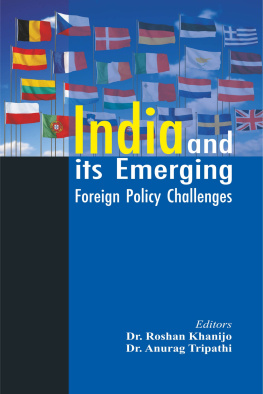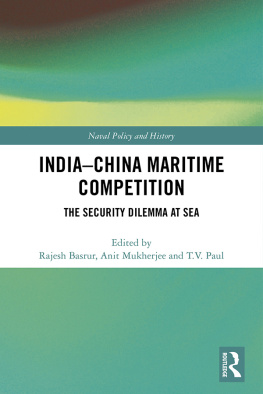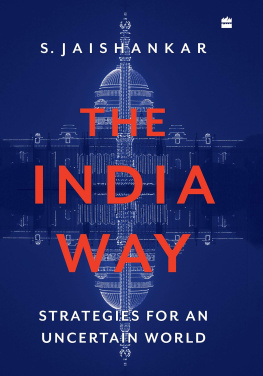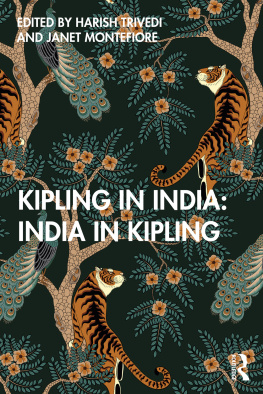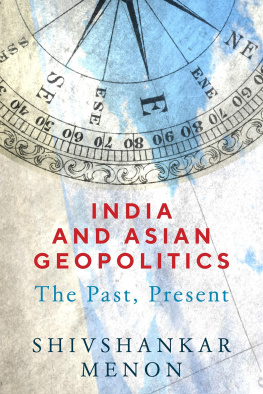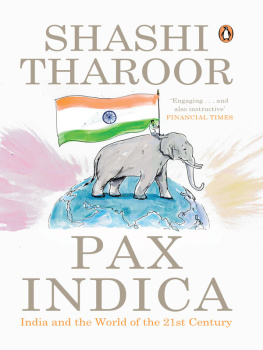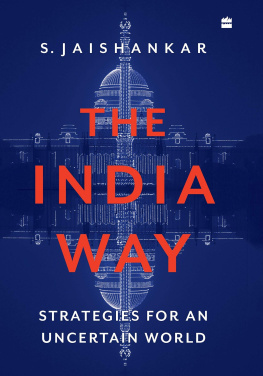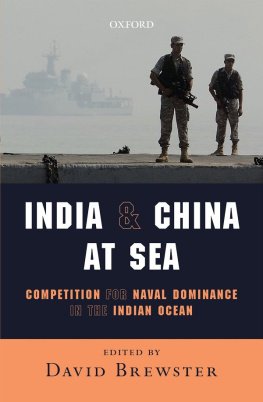The Engagement of India
South Asia in World Affairs Series
T. V. PAUL, Series Editor
Editorial Advisory Board
Rajesh Basrur
Maya Chadda
Stephen P. Cohen
C. Christine Fair
Timothy Hoyt
Paul Kapur
Rajesh Rajagopalan
Aseema Sinha
Titles in the Series
Afghan Endgames: Strategy and Policy Choices for Americas Longest War
Hy Rothstein and John Arquilla, Editors
Pakistans Counterterrorism Challenge
Moeed Yusuf, Editor
Vying for Allahs Vote: Understanding Islamic Parties,
Political Violence, and Extremism in Pakistan
Haroon K. Ullah
THE
ENGAGEMENT
OF INDIA
Strategies and Responses
IAN HALL, Editor
2014 Georgetown University Press. All rights reserved. No part of this book may be
reproduced or utilized in any form or by any means, electronic or mechanical, including
photocopying and recording, or by any information-storage-and-retrieval system, without
permission in writing from the publisher.
LIBRARY OF CONGRESS CATALOGING-IN-PUBLICATION DATA
The engagement of India : strategies and responses / Ian Hall, editor.
pages cm. (South Asia in world affairs series)
Includes bibliographical references and index.
ISBN 9781-62616086-6 (pbk. : alk. paper)
1. IndiaForeign relations1984 2. IndiaStrategic aspects. I. Hall, Ian, 1975 ,
author, editor of compilation.
DS448.E658 2014
327.54dc23
201304888
This book is printed on acid-free paper meeting the requirements of the American
National Standard for Permanence in Paper for Printed Library Materials.
15 14 9 8 7 6 5 4 3 2 First printing
Printed in the United States of America
CONTENTS
Ian Hall
Daniel Twining
H.D. P. Envall
Lavina Lee
Louise Merrington
Harsh V. Pant
Ian Hall
David Brewster
Rajesh Basrur
Nick Bisley
PREFACE
I NDIAS EMERGENCE as a significant global power is one of the most striking developments of the postCold War era. This book explores the strategies that other states have employed to try to shape the foreign and domestic policies of India as a rising power. It also examines Indian responsespositive, ambivalent, and sometimes hostileto the engagement strategies used by other states, as well as Indias own attempt to engage states in its region. It argues that Indias rise cannot be understood just in terms of Indian actions but rather as a dynamic process of domestic change and foreign engagement.
This book is the product of a workshop held at the Australian National University (ANU) in Canberra in November 2011. As the workshop convener and now as editor of this volume, I am grateful for the financial support of the Australia India Institute in Melbourne, as well as the continuing encouragement of its director, Professor Amitabh Mattoo, and his staff, especially Souresh Roy. I am also grateful to Happymon Jacob of Jawaharlal Nehru University and Rory Medcalf of the Lowy Institute for International Policy for their insightful contributions to the workshop. Thanks are due to the ANU for hosting the event, to Satomi Ono for coordinating the logistics, and to Mary-Louise Hickey, whose editorial acumen was invaluable in pulling the final book together. I would also like to express my thanks to Donald Jacobs and the staff of Georgetown University Press.
ABBREVIATIONS
|
|---|
ADMM | ASEAN Defence Ministers Meeting |
ADMM + 8 | ADMM plus defense ministers or secretaries of Australia, China, India, Japan, New Zealand, Russia, South Korea, and the United States |
ALP | Australian Labor Party |
ANZUS | Australia, New Zealand, United States |
APEC | Asia-Pacific Economic Cooperation |
ARF | ASEAN Regional Forum |
ASEAN | Association of Southeast Asian Nations |
ASEAN+ 3 | China, Japan, and South Korea |
BASIC | Brazil, South Africa, India, and China |
BIMSTEC | Bay of Bengal Initiative for Multi-Sectoral Technical and Economic Cooperation |
BJP | Bharatiya Janata Party |
BRICS | Brazil, Russia, India, China, and South Africa |
CAR | Central Asian Republic |
CECA | comprehensive economic cooperation agreement |
CEPA | comprehensive economic partnership agreement |
CSTO | Collective Security Treaty Organization |
CTBT | Comprehensive Test Ban Treaty |
DFAT | Department of Foreign Affairs and Trade |
DPJ | Democratic Party of Japan |
EU | European Union |
FDI | foreign direct investment |
G2 | Group of Two |
G8 | Group of Eight |
G20 | Group of Twenty |
G77 | Group of Seventy-Seven |
GDP | gross domestic product |
GLONASS | Global Navigation Satellite System |
IBSA | India, Brazil, and South Africa |
IFS | Indian Foreign Service |
IMF | International Monetary Fund |
INSTC | International North-South Transport Corridor |
ISAF | International Security Assistance Force |
JWG | Joint Working Group |
LAC | Line of Actual Control |
MFN | most-favored nation |
NAM | Non-Aligned Movement |
NATO | North Atlantic Treaty Organization |
NPT | Nuclear Non-Proliferation Treaty |
ODA | official development assistance |
ONGC | Oil and Natural Gas Corporation |
OVL | ONGC Videsh Ltd. |
PLA | Peoples Liberation Army |
SCO | Shanghai Cooperation Organization |
SLOC | sea lane of communication |
|






